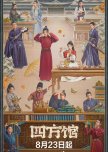
Diplomatic impunity.
Go East starts out as a fresh and interesting workplace comedy about Sifang Pavilion 四方馆, which was an institution that hosted guests and envoys from all four directions 四方/sìfāng during the Tang dynasty. Sifang Pavillion is essentially a Ministry of Foreign Affairs; they handle diplomatic issues from issuing visas, facilitating trade, solving diplomatic cases to negotiating treaties. Yuan Mo is loosely attached to Sifang Pavilion and helps oversea foreign visitors at the city gates, under the indulgent eye of Director Ye Deshui. He is a clever fellow with a predisposition for wine, snakes and bird brains but he lacks ambition and shirks responsibility. Alas, he spots a real strange bird, Ashu, at the gates and makes the mistake of his life by stopping her. She invades his personal space, poisons him, bullies him, frames him, helps herself to his hard earned money and turns his life upside down. This poor man is so alone and lonely that he sucks it all up as if he was deprived of attention his whole life. As it turns out, the Man in White, the deadly leader of the Faceless assassins are after her. To help her, Yuan Mo gets co-opted taking on a proper role at the Sifang Pavilion, where he proves himself by solving a few tricky diplomatic cases.Ashu as a character did not work for me from the get go. She debuts as an entitled bully who blames the hapless Yuan Mo for all her issues, makes unreasonable demands and causes no end of trouble for him. She doesn't bat an eye when her servants openly disrespect him and never apologizes or feels a smidgeon of remorse. She puts herself in harm's way repeatedly with her noble idiocy and half baked schemes, endangering everyone that has to rescue her. This is an ungrateful creature that tramples all over the male lead and is so lacking in intelligence and survival instincts that it is a miracle she didn't perish long ago. I never connected with any Zhou Yiran's roles and her portrayal of Ashu is callous and supercilious to the point that I didn't root for her. Her piteous and repetitive crying scenes made me yawn and roll my eyes. For sure, these scenes are exaggerated for comedic effect but her constant smug expression made her seem mean instead of endearing or comical. None of the female characters are written in a flattering way. Yuchi Hua is also a termagant and is a cliché gender bender character whose only contribution is as token muscle. But at least she softens up and she shows she genuinely respects and cares for Wang Kunwu. This is the latest in a disturbing trend of dramas where the female characters get a free pass for toxic behavior towards male characters who pretty much just roll over and play dead. When did it become so unfashionable to have balanced relationships where men and women just treat each other well?
The only thing that salvaged this drama for me is Tan Jianci's incredibly funny and moving performance as Yuan Mo. This is a refreshing role for him and his comedic timing and expressions are spot on. The character itself is not super well written either; he fell for Ashu too quickly and I remain baffled as to why; he lets her walk all over him and he is super intelligent but ultimately only applies himself for her. The gaping difference between Tan Jianci and Zhou Yiran is that he made me love his goofy, slightly wimpy, deeply wounded Yuan Mo flaws and all; a character who seemed to not quite dare to live until he had to find himself for an ungrateful wretch with the brain the size of a watermelon seed. (Why didn't I live thousands of years ago so he could have found me instead?) Even though they looked cute together, the chemistry between them seemed more friendly than passionate so as a couple, they didn't move me. All those wasted Tan Jianci kiss scenes! But I enjoyed the camaraderie between both couples and the broader Sifang Pavilion team and the hilarious rivalry between the East Court and the West Court. Ye Deshui was MVP for me; he delivered as many comedy gold moments as Yuan Mo did and I loved the hilariously pragmatic way in which he ran Sifang Pavilion and appeased domestic and foreign conflicts.
Plot-wise this drama starts out well as I was genuinely intrigued by the foreign relations premise of the story. The first two cases are interesting and tight and the satire made me invested in the team. After that, the romances starts to take center stage and the to-ing and fro-ing between couples I didn't really care for was not funny enough to keep me engaged. That is also when progressively larger holes in the plot emerges and it snowballs into an avalanche at the end. Along the way, the tone of the drama shifts from silly and hilarious to one where the writer kills off good characters with diplomatic impunity. There was only one good twist in the entire plot, which was who saved the Yanle princess. The identity of the princess was too obvious you couldn't have missed it. Likewise, they cast an actor with an unmistakably prominent feature as the mysterious Man in White. He was flagged early on as a suspect in the Red Lotus case and his identity was just given away during Ashilan's kidnapping. Both these reveals were too early, erasing any sense of suspense. I thought Ashu was as dumb as bricks until they get back to Yanle which is when I realized that in the land of the blind, the one eyed woman is queen. The final reveal of the Man in White's motive contradicts the entire plot because given his identity, he never needed any Yanle princess; in fact a cooperative fake one is much better than the real thing. The smart thing for him to do would have been to eliminate her from the start. This is also what Long Tuqi should have done but Yanle is the land of the dumb after all. Even though it ends in a satisfying way, it was a hollow victory because they won because they were out-dumbed by the antagonists. It is this drama's most unique feature; a race to the bottom where the protagonists and antagonists vie to under smart each other.
Overall, the first half of this drama can be enjoyed as a spoof kind of along the lines of the Austin Powers movies but lacking any underlying intelligence. It is worth watching just to see Tan Jianci do comedy and romance watchers who can ship the couple may enjoy it more than I did. I found it a very mediocre watch, one that feels like a 7.0 more often than not. But I am going to throw in a 0.5 for the fresh premise and Tan Jianci's phenomenal, funny and moving acting to call it 7.5/10.0 overall.
Was this review helpful to you?

The truth will make them free.
This is a review of The Blue Whisper in its entirety - I will not review Part 1 and Part 2 separately.The Blue Whisper is an enthralling fairytale about how love can be both imprisoning and liberating. Set in a fantasy world where sky immortals or fairies instill order and earth immortals or demons are prone to chaos, romantic entanglements between these two clans are forbidden. This kind of inter-species ban pretty much ensures that sky immortals and earth immortals fall for each other with reckless impunity.
Ji Yunhe is the most consummate spirit master among Wanhua Valley's elite cadre of demon tamers. She longs desperately to escape from the Valley; to see the world and be free. Chang Yi, a magnificent and powerful merman is captured by the wicked, conceited Shunde fairy, who tasks the Valley to tame and enslave him. Seeing it as her ticket to freedom, Yunhe vies with her sect brother, the Valley Master's son Lin Haoqing, to complete the task. Where Haoqing attempts to torture Chang Yi into submission, Yunhe beguiles him with kindness, friendship and love. Yunhe successfully manipulates and entices the naïve Chang Yi's heart for her own selfish ends. Along the way, the player gets played as Yunhe falls for his sincerity and sees that it is wrong to enslave such a pure hearted and innocent being. But even though she sacrifices to free him, her well intended lies set in motion a cycle of half truths, sacrifices. betrayals and captivity that ensnares them both. After a long and difficult quest for freedom with many trials, they understand that it is the truth that makes them free.
The story is set in a stunning, enchanted fantasy world with a vivid magical color palette, mystical sets and the best costumes and styling I have seen in a long time. The CGI is well done but errs on the side of being heavy handed at times. The storytelling however, leaves quite a bit to be desired. There are way too many artifacts, especially pearls with endless magical properties to conveniently save the day. And when dead characters keep being revived, both the element of surprise and the emotional impact is diminished. In addition to unnecessary side characters, there are altogether five well developed CPs that explore repetitive tortured themes of taboo relationships, deception, betrayal and how love can both be both confining and liberating. A few of these side stories are not interesting and too long winded and the frequent alternating between too many CPs and plot threads breaks the momentum of Yunhe and Chang Yi's story and makes the main plot stagnate as well. Thus I did not feel Yunhe and Chang Yi's chemistry or get invested in their storyline until Part 2 where many threads converge and the storytelling improves markedly.
I am really happy to see Dilraba take on the role of such a complex and conflicted character as Yunhe; one that undergoes so much anguish and such profound change. Though she made me feel her love and pain many times, I still like her portrayal of the cunning, manipulative and self serving Yunhe in the beginning best. As for Ren Jialun, he is a master of the unspoken and of intense suffering in silence. I can't fault his performance and am simply tickled that he is willing to do so many kiss scenes with the exquisite Dilraba. They look so incredible together in this production that they must be the most gorgeous costume drama couple by a wide margin. That said, while Chang Yi is intensely single minded when it comes to love, loyalty and righteousness, this is not innately a complex character and thus the role doesn't quite do Ren Jialun justice in terms of broadening his acting repertoire.
The character that compells me to the point of stealing the show is Lin Haoqing; brilliantly and sublimely articulated by Xiao Shunyao. From the get go, I was more drawn to Haoqing's chemistry with Yunhe - they are on the same wavelength, bound by history and layered and complex emotions. Like Chang Yi, Haoqing is torn between duty and Yunhe but unlike Chang Yi who is more reactive, he proactively schemes ahead, takes bold risks and tries for win win outcomes. Lin Haoqing and Yunhe get to do all kinds of interesting and important things that advance the plot while poor Chang Yi is relegated to safeguarding Beiyuan and dealing with the petty, boring issues of the fox clan. Chang Yi only comes in useful in mighty showdowns and even then, his power ups are marred by unflattering camerawork that catch him scowling angrily as if he is trying to take a dump. I can't help but feel that the plot short changes my beloved sour faced Ren Jialun, an actor I am super fond of. That said, I only have praise Xiao Shunyao's ability to make me feel Lin Haoqing's suffering no less than Chang Yi and Yun He's. I hope good things happen to this handsome and compelling actor.
Though I don't consider Xian Shi or Shunde's motives as villains that convincing, both roles are very well acted. In fact, Guo Xiaoting's Shunde can give one of my all time favorite villains, Angelina Jolie's Maleficent a run for the money. Guo thrusts herself into the role with mesmerising relish and wicked abandon. A dash of dark humor would have rendered the portrayal incomparable. As for the rest of the (too) extensive cast, even though a few characters got screen time that was disproportionate to the substance of their storylines, the roles are well performed enough to win a place in my heart. The friendship, support and sacrifice from Fan Zhen and Lishu as well as the hilarious Kong Ming and Luo Luo is clearly what gets Yunhe and Chang Yi through the loneliness of their many trials and tribulations. And I just simply love the idea of such a youthfully adorable Tian Jun.
This drama finishes strongly with an exciting and well chareographed final confrontation. But I won't lie, the ending is a bit of a blue whimper. There are simply too many reversals that make me roll my eyes. As for the final 5 minutes, it succumbs to c-drama's nasty habit of wanting to be all things to all people. Nonetheless, it is still an acceptable finale that from a certain point of view can be seen as quite fitting. The storytelling in Part 1 tried my patience and is at best an 8.0 but I really enjoyed Part 2, which I can happily rate a 9.0. Since I don't think it makes sense to rate both parts separately, this is an 8.5 overall. As of end April, this is my personal top ranked drama for 2022.
Was this review helpful to you?
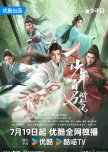
One that loved not wisely but too well.
Once upon a time in Beili, there lived a woman who was simply too beautiful 倾国倾城/qīng guó qīngchéng; she could fell a city with one look and fell a kingdom with a second look. This kind of woman is a menace to mankind that can only be locked out of sight in a gilded cage. This is the cautionary tale of a brave man, one that loved not wisely but too well who dared to set her free. And his one true friend who tried to help him do the right thing.Dashing Youth 少年白马醉春风 or Young White Horse Drunk in the Spring Breeze is the highly anticipated prequel to 2022's dark horse hit high fantasy martial arts drama The Blood of Youth 少年哥行. Like its predecessor, it is a youthful coming of age story about friendship, adventure and the spirited idealism of youth. Even though Baili Dongjun is the titular character, it is equally his best friend Ye Yun's villain origin story. They are parallel characters; both innate martial artists and scions of the Beili empire's founding families. As boys, they vowed to storm the martial world together when they grew up; Yun as the Sword Deity and Dongjun as the Liquor Deity. After the Ye family's downfall, they are destined to go down opposite paths. Dongjun lives a charmed life; making a name for himself as Li Changsheng's final disciple at the prestigious Jixia Academy; surrounded by new friends like Sikong Changfeng and Beili's Eight Talented Gentlemen. He reunites briefly with Ye Yun, who now calls himself Ye Dingzhi. In sharp contrast, Ye Dingzhi's path is a lonely one, full of obstacles, inequities, betrayals and brief snatches of happiness.
At its core, this is quite a straightforward story that is cluttered in the storytelling. There are too many digressions into the Who's Who of the martial world and and its pretentious rankings. While the fan service is terrific, such a dazzling array of too hot to handle swordsmen put my exploding ovaries in danger of apoplexy. The surfeit of hot filler characters with shallow side stories distract from the main arcs. For all their fancy swords and pompous rankings, all we see are a few showy poses and twirls before the CGI takes over and screen explodes in a gory orgy of light and digital creatures. While the CGI is well done, it is a big let-down not to see a few well choreographed live action fight sequences.
I was happy to see Hou Minghao dub himself as Baili Dongjun. It makes a big difference in how the character comes to life. While his acting is still a work in progress, he plays a character he can relate to and it shows. Ye Dingzhi is a more complex and intense role, one that He Yu pulls off charismatically. Even though he does questionable things, I empathized with him every step of the way. It would have been nice to see more of Xia Zhiguang's Sikong Changfeng. The humor and camaraderie between all the dashing youths is one of the drama's highlights. Even though the romances are not convincingly written or well developed, I liked all of the couples enough to root for them. The role of Yi Wenjun should have been more sympathetically portrayed instead of just as helpless, selfish and willful. The lovely Ye Yao is only Dongjun's muse, her character doesn't get to do much.
The irreverent Li Changsheng/Nangong Chunshui is the funniest, best acted and most engaging character in this story. Even though his arcs don't tie well with the main plot, the narrative visibly sags after his exit. His parting words to his disciples 凭心而动/píng xīn ér dòng or "act according to your heart" captures the spirit and idealism of youth that is Dongjun's lifelong mantra; one that years later, he passes on to his disciple Tang Lian. He helps Dingzhi steal the bride because Wenjun was not willing and therefor it is wrong to force her. It is the simple, absolute truth that trumps the cynical calculations driven by politics and expedience. He never wavers from this belief. It is true that Wenjun is a selfish, weak and dislikable character who makes terrible decisions with devastating consequences. But she was still wronged in the first place. Thus like Dongjun, I understood, even tried to empathize with her until she was too easily manipulated into returning to Tianqi. That was not only a stupid decision, it showed that she simply did not trust and love Dingzhi enough to wait for him. Poor Dingzhi, he never got any breaks. Even the love of his life failed him at the end. Through sick and sin, it was always and only Dongjun who remained his one true friend.
There is little new in the political plot that wasn't revealed in dialogue and flashbacks in TBOY. Which would be fine if they fleshed out the character stories and the succession struggle instead. But those are dealt with cursorily with Ruojin left as a blank cartoon character and the relationship between the brothers not explored. TBOY romanticizes Prince Langya as a tragic hero, the noble uncrowned king of Beili. In this prequel, he is the character that disappointed me most. He tore up his father's will out of misplaced loyalty and his own selfish desire to live an unrestrained life. He never made the case for why Ruojin was more worthy, supported him unconditionally and in the case of Wenjun, enabled him even though he knew it was wrong. There was never a so called greater good or do or die reason why Wenjun had to marry Ruojin, it was simply a matter of imperial privilege and entitlement. They could have escaped with his help and everything could have been so different. But I don't hold him solely responsible; there were so many malign forces at play and bad decisions that there is plenty of blame to go around.
The ending to this story leaves that bitter after taste that the bad guys won. It makes too convincing a case that a too beautiful woman who can topple kingdoms must be safely locked out of sight so she can do no harm. Both Wenjun and Dingzhi paid a high price for their mistakes but too many people who pushed Dingzhi down the dark path got off unscathed. In the novel, Dongjun has an epiphany about his own dào/道 or convictions in the middle of his fight with Dingzhi. He switches sides and punches the daylights out of the emperor instead. He scolds him: "She does not like you, why force her to marry you? She has escaped and is living a happy life, why lock her up again? You are the emperor with a harem of 3000. My brother only loves one person. Live and let live. Learn from your brother, he can even let you have the throne, why can't you let my brother have one wife?" Even though it changed nothing it was something that had to be said. Without this scene, Ruojin is never called out or held accountable for his role in starting a war over a woman. Instead it is Dingzhi who is destroyed and villainized for trying to hold on to a grass hut in a tiny corner of the world where he was happy. It is very hard to feel good about a story that ends like this.
This messy and disappointing prequel was in some ways limited by what was already canon in TBOY but still could have been better on multiple fronts, Nonetheless it is a chock full of eye candy and a fun watch if you don't look too hard at it and ignore the inconsistencies with TBOY. Even though this is a critical review I enjoyed the drama. I am just mad because it had the potential to be almost as good as TBOY. But it wasn't and so I can only rate this 8/10. I am still happy to recommend it , especially if you loved TBOY. If you liked Wuxin before, you will love him more after knowing his parent's story.
Was this review helpful to you?

Can't judge a book by its cover.
Judge Dee is one of the most widely adapted and iconic ancient Chinese detective figures in popular culture. Di Renjie, or Judge Dee was a prominent Tang Dynasty official and twice chancellor to Empress Wu Tzetian. In the 19th century, Dutch sinologist and diplomat Robert Van Gulik translated an 18th century novel by an anonymous author Dí Gōng Àn/狄公案/Celebrated Cases of Judge Dee, into English. He went on to write numerous other Judge Dee mysteries, increasingly crafting Judge Dee in his own image. Van Gulik's books are regarded as a cultural bridge between East and West. They were devoured by the Chinese diaspora long before Tsui Hark fanned the flames with his wildly popular Detective Dee movies.Judge Dee's Mystery/大唐狄公案 loosely adapts nine cases from Van Gulik's novels for the small screen. This drama has notably high production values with lavish sets and costumes designed to create an immersive visual experience. The cases are well crafted with meticulous attention to detail and pay homage to Judge Dee's reputation as a people's hero; a champion of truth and justice for the common people. The cases highlight the discontent at some of Empress Wu's policies and shortcomings of the Tang Code, China's earliest legal code. Di Renjie gained many insights on the struggles and aspirations of the common citizens as magistrate of many important provinces across the empire. This shaped him into a great statesman and reformer in his later years; a chancellor often known to stand up to the formidable Empress.
This is the kind of drama that I should love - its my favorite genre featuring my favorite Chinese detective, set in my favorite Chinese dynasty and is helmed by a few of my favorite actors. The fight scenes are fantastic and the whole thing just looks gorgeous and bloody expensive. Which just goes to show you, you just can't judge a book by its cover. Because even though there are some really great moments, overall this drama just bored me silly.
The problem with the cases is that the four episode are too long when the villain is usually obvious from the beginning. There is not enough development of the suspects or the victims to make the audience care about the why-did-it. The audience also does not get to participate in the solution. Instead, the intricacies of the how-did-its are revealed as flashbacks in Judge Dee's mind's eye. The cases do get better in the latter half as they tie into Judge Dee's past and are shored up by the appearance of characters like Diao Xiaoguan (Zhang Ruoyun) and Lin Fan (Jiang Yi). Even then, the writing tends to tie the minute details together well while leaving big gaps on important things. Thus it is never fully explained what Diao Xiaoguan's motives were or what terrible thing the young scion of a noble household did that got him disowned and left to fend for himself.
The biggest issue with this drama is that Zhou Yiwei pretty much carries the entire crime-solving team by himself. None of the supporting characters are well designed and there is zero chemistry between Ma Rong, Qiao Tai and Judge Dee. This is made even more obvious when Deng Xiaoguan shows up and there is a tangible difference in the dynamics between everyone. Both of Dee's sidekicks appear and disappear inexplicably in the middle of a case as and when the plot requires. Ma Rong is written to be a comically obnoxious character but there is nothing funny about her obnoxiousness. This is the obvious the weak link in the cast and one that is utterly lacking in charisma that unfortunately gets too much airtime. Inasmuch as Zhou Yiwei and Wang Likun deliver a heart-stopping and mature portrayal of attraction and love at first sight, sadly Cao An is written to be a blank character; an elegant musician well past her youth clinging to a silly girlish fantasy over a highwayman (face palm). She only serves decorative purposes until the final case, where she finally gets to shine with her bravery and her foolishness.
In conclusion, this is a visually stunning production that stays true to its source material in terms of setting and thematic elements. However, despite some exciting and well choreographed action scenes, it fails to deliver truly captivating mysteries and is bogged down by lackluster supporting performances. While the cases in Strange Tales of Tang Dynasty (2022) are only a tad more tightly written, the humor and fantastic crime solving team dynamic elevates that series over this one. That said, Judge Dee's Mystery is not a terrible way to pass some time even though it ultimately falls short of making a lasting impression. I rate this Seasons 1 a 7.5/10.0. Season 2 has been filmed and should air by early 2025.
Was this review helpful to you?
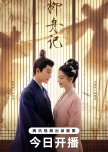
To Catch a Thief
Cui Xingzhou, the mighty Prince Huaiyang has been trying to catch a thief, the slippery bandit Lu Wen for some time. He stumbles upon a comatose Liu Mintang and like all princes, he simply cannot let sleeping beauties lie. Convinced she must be the beloved mistress of his nemesis, he rescues her intending to use her as bait. Conveniently, she has amnesia and mistakes him for her husband ! Thus this cold and formidable fief lord awkwardly assumes the persona of an indolent and not terribly successful merchant who dotes on his wife. Miantang's true colors emerge as a determined and capable business woman with an scary knack for turning hairpins into lethal weapons. It seems Xingzhou may have bitten off more than he can chew as it becomes clear Miantang has secrets and hidden depths that she herself barely remembers. Meanwhile his elaborate charade and lies keep snowballing until eventually half the town is complicit. What ensues is the kind of comedy of errors that arises when hero syndrome meets analysis paralysis. Complicating matters, her memory and past life catches up with them just as they both become invested in their fake domestic bliss and fall for each other. How will they to resolve their past grievances and make a life together as their true selves?What I appreciate most about this drama is both Xingzhou and Miantang are grey characters who have agency if not free will. They are well matched in terms of cunning, intellect, ability and ruthlessness. I enjoyed watching them work against each other almost as much as I enjoyed their working together. As someone who loves dark characters, I wish they toned down the comedy and dived into a darker and more passionate exploration of their undeniable chemistry and stunning visuals. While Zhang Wanyi is an exceptional character actor, comedy is not his forte. His expressions and delivery is almost too textbook perfect and his comedic timing lacks spontaneity. He pauses for too long to let the punchline sink in when he should keep going as the audience already got it and is waiting for the next joke. The humor is straightforward and not that sophisticated so it needs to unfold at a fast pace to hold audience interest. To speed things along, I watched most of this drama at 1.25 speed, something I almost never do. The comedy also masks that Xingzhou is quite a dark character that does controversial things to Miantang, manipulating her to the point of gaslighting. Zhang Wanyi could have pulled off a darker portrayal in an absolutely riveting and charismatic way so that is an opportunity missed. Nonetheless, he is compelling as a powerful and complicated fief lord who to his chagrin, falls in love with the enemy; a most unlikely and unsuitable woman.
Wang Churan is a vivid beauty and her comedic timing is more instinctive than Zhang Wanyi's. Her portrayal of the amnesiac Miantang is natural and charming. However, her character transitions after Miantang recovers her memory could be better written and portrayed. Part of the problem is in the novel, Xingzhou crosses some lines that he does not cross in the drama. Thus Miantang's rage and sense of betrayal is disproportionate to what actually happened. The stabbing scene was undeserved and this kind of violence is off-putting and has no place in a story where the couple is not breaking up for good. Beyond that, Miantang is a worldly character, a rebel who was on fairly intimate terms with Ziyu without much regard for her reputation. She played in the same sandbox with the big boys so it was baffling to see her go so full on girl angry at Xingzhou, who was just doing his job. These are mostly writing issues but there is also something lacking in the acting. Wang Churan was not able to reflect the character's evolution and approached it as if Miantang became a different person. There are unspoken ways to convey that at the core, Mianting is still the same Miantang; that the person Xingzhou fell for is still there. A more experienced actress would have used micro-expressions and subtle character traits to achieve this. And then just as inexplicably after the angst drags on long enough, she becomes sweet and forgiving domestic Miantang again! Since Wang Churan is new to lead roles and she is so lovely, I am happy to be forgiving. Nonetheless this diminishes Xingzhou as a character and made him appear no less a foolish, love brain than Ziyu. I am also left with a nagging concern that Miantang may be bipolar!
Even though this drama has some interesting and unique ideas and is refreshing in the way women are portrayed, I found it to be a bland watch overall. Despite some fun and memorable moments, the plot arcs are shallow and rehash well known battle for the throne tropes. Which is fine if the character arcs are well done but while the main characters are complex, they are dumbed down by the comedic focus. Miantang is inconsistently written; she starts out as a strong and independent woman who doesn't need to get married to have a fulfilling life. She abandons Ziyu's cause without a backward glance, abandons her revenge arc after a half-hearted attempt to infiltrate the palace, takes over an escort business before deciding she liked playing house best. At the end, I couldn't figure out what she was about. The character I enjoyed best turned out to be Shi Xueji. She finds so much joy in life's simple pleasures, is resilient and her quiet wisdom and dignity impressed me as much as Miantang's inconsistencies did not. I loved how the actress conveyed a layered character with deep and moving emotions via subtle expressions and a gentle smile that radiates with unbridled happiness. I also quite enjoyed Ziyu's character but the second couple was coma inducing and completely irrelevant to the story.
The drama finishes strongly at the climax in both the conspiracy and character arc but doesn't change the fact that despite its fresh premise it did not have enough substance to support 40 episodes. It would have been a more enjoyable watch at a tight 24 episodes or if they had engaged in a deeper and darker exploration of the characters. Nonetheless if you don't over analyse, it is very entertaining as a light romantic watch with phenomenal acting by Zhang Wanyi. My rating is 8/10 but I can see romance fans rating it a bit higher.
Was this review helpful to you?

All the world's a stage.
The Double is a dark and melodramatic soap opera about revenge and regret. It is a soap opera to end all soap operas in terms of high theatrics, spinning hussies, piercing death glares, shocking twists and the sweet, savage satisfaction of retribution. To best enjoy this, don't look too hard at it as the narrative is littered with logic and plot holes and absurdly dramatic, historically impossible scenes. The male lead Duke Su flirts with breaking the fourth wall repeatedly to urge us to just watch the play, a reminder that all the world's a stage and we should just suspend disbelief.Xue Fangfei, the most elegant and cultured lady in the capital, is cruelly betrayed and dumped in a shallow grave. She is rescued by Jiang Li, the Chancellor's daughter who is wrongly condemned and banished by her family to a convent. Fangfei assumes Jiang Li's identity and returns to the capital; vowing to clear both their names and make their enemies pay. She is aided by the enigmatic and powerful Duke Su who helps her because she intrigues him and could prove useful to him down the road. The romance that develops between them unfolds at a leisurely pace as they each have high stakes agendas that predictably converge.
Duke Su must be be every scorned woman's ultimate fantasy "consolation" prize. This magnificent specimen of manhood is highly born, tall, dark, handsome, powerful, and with a diabolical mind to match Xue Fangfei's. The icing on the cake is this sexy beast that wields a fan more effectively than a sword does not come saddled with nasty in-laws. Wang Xingyue's potent portrayal of Duke Su is spot on from the tinge of humor that belies his stern expression, his double entendre laced dialogues to how in unguarded moments his eyes devour Xue Fangfei with almost indecent longing. Despite the seductive build up and combustive chemistry between the main leads, the ultimate pay-off to their slow burn courtship falls far short of wild and wicked and only delivers a chaste candle-gate moment.
Even though I shipped Duke Su and Xue Fangfei immediately, I appreciate how Fangfei takes the time to rage, to mourn her loss and to get closure so that she can properly move on. To me, Wu Jinyan obviously looks older than Wang Xingyue, butI think this casting makes sense. Xue Fangfei is a woman who lost everything; her reputation, her lover, her entire family. That kind of shocking devastation would age anyone tremendously and Wu Jinyan's ravaged, strained and wild wide-eyed expression in the early episodes is brilliantly in character. The narrative does not shy away from presenting her marriage as one that had depth and substance. Thus they are still in perfect unison when they play their haunting duet; a song of profound loss, resentment and regret. Wu Jinyan plays the avenging angel so perfectly I got unholy enjoyment out of watching Shen Yurong squirm knowing that Xue Fangfei, who knows him better than he knows himself, is coming for him.
Shen Yurong is a character that I find hard to be that angry with because as it turns out, his perfidy results in such a massive upgrade for Xue Fangfei. Liang Yongqi really slays in this complex role of a promising, rising young official who catches the eye of the wrong woman and ends up betraying his ideals. He is quite a pitiful creature who trades in domestic bliss for living dangerously at the beck and call of an abusive, insecure and bat-shit crazy spinning shrew that his own dear mother pimps him out to. I can't decide if I pity him or despise him more. Because in truth, he already lost the moment he chose to betray his muse and the love of his life. The moment of peak retribution is when it dawns upon him what a prize he lost and is forced to face the limits of his own character. I thoroughly enjoyed how the narrative peels away the many layers of hypocrisy, ambition, sophistry and duplicity to reveal a weak, impotent coward who lacked the courage of his convictions. To me, this is the most complex and best acted role in this drama.
Even though I have high praise for Li Meng's portrayal of the deranged Wanning, I have little sympathy for this character or her shocking villain origin story. Victimhood does not entitle her to help herself to someone else's husband or kill with such impunity. When she had power and free will, she chose to be King Cheng's pawn, no one forced her. Likewise, I have no sympathy for Ji Shuran or her choices. In general, I dislike these attempts to whitewash villains or somehow rationalize their wicked ways. Bad stuff happened to Xue Fangfei and Jiang Li as well. But they looked for justice without turning into monsters as a result. While Xue Fangfei's revenge, if you can even call it that is very satisfying, Jiang Li's left me feeling bereft. Ultimately Xue Fangfei is a character that lost nothing and gained everything. It is Jiang Li who is truly the injured party and even though she is vindicated, all the king's horses and all the king's men can't put her together again.
Despite the addictive start, this drama loses momentum by episode 30. The storytelling lingers too long on weakest Jiang family plots arcs. They are boring and unoriginal, borrowing heavily from what were also weak arcs in Princess Weiyoung. Jiang Li's cousins are archetypal characters that were not complicit in Jiang Shuran's treachery. I find it unfathomable the drama chose to focus on their tawdry squabble over a callow rogue instead of uncovering the many layers of the far more fascinating Duke Su. As a result, this character with so much early promise ends up not as well developed as Shen Yurong and Wanning. To add insult to the injury, almost as an after thought, he is featured front and center in a baffling truncated half episode final arc that serves up gratuitous angst and some unearned and unjustified pin-cushioning of good characters. It is nothing short of a grift to squeeze money from viewers for a mundane glimpse of domestic bliss. As far as I am concerned this drama ends where it should a bit past the halfway point of the final episode. All the rest is dross.
This is a super addictive soap opera that doesn't hold up under close scrutiny. Where it excels is in serving up high drama and angst with super cool and satisfying but absurd vignettes that don't necessarily advance the plot. Nonetheless I was happy to rate this better than 8.5 until it started to sag and waffled into a lame and wishy washy ending that leaves me no choice but to call it an 8.0/10.0.
Was this review helpful to you?
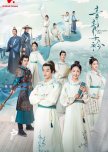
Poetry in motion.
This is a really fun and adorable school romance drama that will steal your heart. It carries the underlying message that education should be a universal right but it does not necessarily produce a moral person.Wen Renjuan is swept off her feet by a seemingly wicked man from a different world in a brief but unforgettable encounter. They reunite at the prestigious Zhuxiu Academy after Luo Qiuchi wins a place in a national poetry competition. Of course it is impossible back then for even elite young women to be formally educated, in a co-ed academy no less! But since the setting is so much fun and it avoids the muss and fuss of the cross dressing trope, let's let that one slide. This is mostly a coming of age character drama that explores class conflict and how different students of Zhuxiu Academy respond to competition, envy and disappointment in academics and relationships.
The best thing about this drama is watching the character and relationship development of the two main couples - it is literally poetry in motion. Both couples are lovable and so convincingly "belong together" I have a hard time picking a favorite. Renjuan is the character that grows the most in the drama - she blossoms from a timid girl into a feisty, clever and simply irresistible young beauty who fights fiercely for her beliefs. Lu Xiaolu is simply a joy to watch in this role; she has the cutest, most natural facial expressions and gestures that convincingly conveys the innate goodness of Renyuan's nature. The way initial attraction turns into love and how Qiuchi and Renjuan grow together as a couple as they get to know and understand each other is just breathtaking. I particularly enjoyed watching Qiuchi temper his natural possessiveness and protectiveness towards Renjuan to give her room to make her own decisions and judgements even when he knows she is not on the right track. With quiet, gentle but unyielding insistence, Wenjuan bends Qiuchi to her will and helps him accept and let go of the bitterness of his childhood losses. This is one of the best, most realistic couples I have seen in terms of how their relationship grows from strength to strength.
In sharp contrast to Qiuchi and Renjuan, Hang Ruxue and Qing He are a much more reserved, less demonstrative couple. But it is clear their feelings for each other are conveyed less with words and more with deep soulful glances and actions. It is just as moving to watch the skittish, love struck Qing He's confidence grow as she wins the heart of her strong and silent general. Xie Binbin's Ruxue is so intimidatingly endearing I hope to see him in many more lead roles from now. I also love the camaraderie between both couples and how they support each other. My favorite character however has to be the boy emperor - he cracks me up every time!
Where this drama falls down is in the plot and the pacing. It opens really strongly with a fresh and exciting initial meeting between the leads. We get a lot of great action and thrilling twists in the first 10-15 episodes of the drama and the plot unfolds at an engaging pace. However, the overarching plot peaks too early and then lapses into a series of charmingly heartwarming but bland school related short plots that lack complexity and are easily resolved. It helps that it hones in on the dynamic between the couples and is so well done that I didn't mind that the plot threads water. However, both relationships peak shortly thereafter and while the lovey dovey couples are adorable, the pace is slow from then.
The main problem is that the villains are revealed very early on but they hang around until the bitter end. It does not help that the writing gets sloppy and illogical things happen in the ending arcs. For example, Renjuan's hard won martial arts skills evaporate in thin air so that she can be helpless and easily overcome by the villains as is required by the plot. The villains are also repetitive and unimaginative with shallow and tropey motives. The final (usually best) villain could not get any sympathy from me, I just rolled my eyes at his boring histrionics. It is not a lot to ask that the most complex villain in the story does better than that! At least two of the villains could have been tackled together and this could have been a much better drama with about 10 episodes fewer.
I consider this a heartwarming and good character and relationship drama with some truly entertaining moments. And I am sure you will watch one of my favorite and most hot, squeal-worthy hilarious a moments at end E5/beginning E6 at least two times... I rate this a very enjoyable 7.5 but I had it at 8.0 until about the last 10 episodes.
Was this review helpful to you?

The Dark Side of the Moon.
This drama is about how a power couple that is well matched in terms of cunning, ambition and capability scale the upper echelons of banking and finance during 1930s Shanghai. The narrative vividly captures the wild, morally ambiguous, highly speculative, wheeling and dealing nature of the mafia dominated banking and finance industries during that early period of industrialisation.Cheng Yizhi is a scrappy, enterprising, self educated young orphan with a knack for numbers and finance who is raised by a kindly shopkeeper. He starts out in a lowly position at a bank but his talent propels his rapid advancement to become the protege of banking magnate Huang Ruhong. Wu Lizi is the pampered daughter of a distinguished banker whose world falls apart when her father is framed and commits suicide. Hell bent on revenge, she marries Yizhi and ruthlessly uses his access to banking circles to investigate her father's downfall. Mutual lack of communication and a terrible, irreversible decision by Lizi ruins their marriage but leads to a very rewarding business partnership where they build a bank together.
Wu Lizi is one of the most selfish, devious, manipulative, ruthless and utterly charming female protagonists I have come across. It is such a treat to get complex and fascinating female characters like Lizi. That is why I kept watching this even though at one point I was enraged and disappointed to the point of almost dropping. I still don't like how they wrote Lizi to lash out so viciously and vindictively with such heavy consequences but I am glad I kept going because she really moved me with her stoic remorse and acceptance later on. Even though there were some rough edges to Cai Weijing's performance, overall she is tough, willful, curiously vulnerable and so charismatic that I could literally see how she tied Yizhi, Charlie and Xu Du up into knots emotionally.
Zhang Xincheng delivered a most excellent performance in this drama as Cheng Yizhi, a cynical character that well understands the dark side of the moon due to his upbringing on the rough side of town. So he is the ultimate nemesis of dark characters like Huang Ruhong because he can get into their heads and narrowly manages to stay one step head of them. In sharp contrast, he seeks the light in all of his dealings and finances some of the most promising industrialists of the day. At the onset Yizhi goes toe to toe with crooked businessmen and corrupt politicians with equally scheming and wily tactics. But as the story advances and his dark secrets are revealed, the character is whitewashed and becomes too perfect, so understanding with such shiny plated plot armor that I had to roll my eyes. I needed more flaws or to see him be a little bit petty or selfish and to play dirty sometimes. Instead Charlie, a far more interesting and lovable character rises to the occasion to do all the slightly shady things that need to be done in order to stymie their unscrupulous rivals. Nonetheless the lead couple has superb chemistry and the way their relationship blossoms from mistrust and suspicion into an incredible partnership on multiple levels is one of the drama's strengths.
The business subplots are quite interesting, well written and the financial concepts are kept at a simple enough level for laymen. The characters however are less well written and notably Lizi, is not consistently written. For such a smart character she does some retarded things that can only be put down to sloppy writing. Huang Ruhong's somewhat creepy and unfathomable hard on for Yizhe is also unconvincing and not in character for the leader of the criminal underworld. Indeed the true love triangle in this drama is the one between Ruhong, Yizhe and Lizi. This was such a promising antagonist at the start but gets sidelined as the ending arc digresses into yet another patriotic fight the Japanese invaders plot. I would have preferred to see a more satisfying cat and mouse takedown of this smart antagonist play out properly. Towards the later episodes, many key characters are gratuitously killed off to squeeze out the obligatory tears expected of a Republican period drama. This backfires as I only felt very sad for two of the deaths which only highlights that the other characters were two dimensional ones that I never got invested in.
There are many enjoyable and unique aspects to this drama that make it worth watching even though it falls down on messy plot, sloppy character writing and a lame ending arc. Charlie was my favorite character and his wit, style and wisdom saved the show. Overall this is just a 7.5 for me despite strong acting by the leads. And MVP Charlie (Wang Zijian).
Was this review helpful to you?
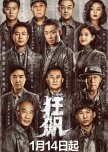
The road to perdition.
To put it simply, The Knockout knocks it out of the park with its audacious portrayal of an anti-villain as the main protagonist. Spanning twenty years, it is a masterful account of how a struggling everyman insidiously strays onto the road to perdition. The stage is set brilliantly from the get-go to manipulate us into sympathizing with a character who does terrible things. We are blinded by their humanity and blame the system for failing them, forcing the oppressed to become the oppressor.Gao Qiqiang starts out as a humble fishmonger doing his best to raise his younger brother and sister. When thugs threaten their livelihood, he stands up to them but is framed and arrested. An upstanding young officer An Xi suspects he was bullied, books the case leniently, and tries to keep his tormentors at bay. Ironically with small acts of kindness, An Xi empowers Gao Giqiang and propels him in unimaginable ways. The complex and sincere bond of empathy and indebtedness that is forged between the two men is the linchpin of this story. Their most pivotal character turning points and moments of truth play out on the neutral ground of a humble noodle shop. where much is revealed with few words.
It is clear from the outpouring of accolades that Gao Qiqiang is an iconic portrayal that put the hitherto under-appreciated Zhang Songwen on the map. Gao Qiqiang is a visionary mastermind who draws inspiration from Sun Tzu's Art of War. He is dangerously underestimated because of his amicable facade and his disarming affection for and vulnerability with those he cares for. The way he embraces fashion to please his wife to how he willfully blinds himself to his brother's weaknesses is both touching and relatable. When crossed, threatened, or betrayed, he is unforgiving and cruel to the point of depravity - no one is safe from him. He is chillingly ruthless and implacable when it comes to imposing his own brand of loyalty and justice. Like any good sociopath he oozes regret but in truth has no qualms about sacrificing his generals. He "makes it right" by caring for their families sincerely and with deep gratitude. He is bound by a very misguided code; one that is ruthless and amoral yet oddly authentic and honorable. Zhang Songwen embodies this character so well that some believe he is not acting and insist he should be at least investigated, if not locked up.
An Xi is both Gao Qiqiang's savior and his nemesis. More than anything, he is his biggest victim. This character makes me sad and mad. He is well meaning and does the right thing with all the wrong outcomes. Zhang Yi was reluctant to accept the role of An Xi, feeling he wasn't a good fit and wouldn't able to pull it off. But Zhang Songwen's Gao Qiqiang would not be so compelling without Zhang Yi's An Xi. It is their incredible rapport and ability to silently communicate that makes the small screen seem huge. Zhang Yi's expressive gaze and more subtle style is the perfect foil for Zhang Songwen's flamboyance and charisma. While I admired and sympathised with Gao Qiqiang, An Xi is the one that often moved me to tears. His speaking eyes frequently implore Gao Qiqiang to be a good man and convey bottomless dejection that gives lie to the goofy smiles he flashes at Meng Yu. The aging of characters over three distinct time arcs across twenty years is rarely captured as well as it is here. But it is Zhang Yi that simply nails this part - he is wary and tired but not quite beaten; the righteous flame in his eyes are dimmed but at the core still burns hot.
This drama is impeccably cast and is a who's who list of China's best actors, all of whom deliver immersive performances. The director's incisive lens meticulously peels back the many layers of the multi-faceted characters and their intricate relationships. The female characters are written to be strong and impactful beyond their screen time. Li Yitong really takes her acting to another level as Meng Yu; it is by far her strongest, most memorable role to date. Her screen chemistry with Zhang Yi is unexpected and endearing. And then there is Gao Ye's simply sensational Chen Shuting, the ultimate gangster's moll - cool, stylish and fearless. The way she menaces the wits out of Gao Qiqiang is one of the drama's highlights for me. There is a lot more on-screen violence in this drama than I expected. While the worst of it takes place off-screen, it is so well staged that it is more visceral and blood thirsty in my overactive imagination.
The rich plot builds to a shocking, unpredictable and devastating climax about a third of the way through. Then it loses momentum and in the final ten episodes it limps toward a predictable ending. This is somewhat to be expected as this was produced in partnership with the state, the nationalist message is inevitable.I really did not care about the party's anti corruption task force and yawned through their heroic sweep through Jinghai City to weed out the endemic corruption that had seeped into the cracks at every level of the bureaucracy. It is clear that there were some cuts and at least one character is whitewashed but I don't think it changes the gist of the final outcome. The final confrontation between Gao Qiqiang and An Xi saves the entire arc and there were enough characters I cared about including Meng Yu that it was still overall a decent arc. All considered, I am not as dismayed by the way this ends as others are. The fact that the government always wins is a foregone conclusion and not a spoiler in any crime and/or corruption themed Chinese drama. But in this case, I don't really think it shines that great of a light on "the good guys". I mean where were they for twenty years? And I am not sure the "good guys" win here. Poor An Xi is definitely is not a winner; in fact no one wins. Indeed audiences overwhelmingly empathise with Gao Qiqiang. Thus this is actually a very dark crime story with a surreptitiously bold and critical ending.
This spectacular crime thriller is a must watch. The first 30 episodes feel like a tour de force that can easily be rated 9.0/9.5. The rest are more at the 8.0 level so 9.0 feels about right for my final rating.
Was this review helpful to you?
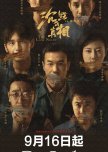
Scorched earth.
This is an artfully related dark crime thriller about a long, life blood sucking and soul destroying quest for justice. A body in a suitcase, a bomb scare, an incriminating old photograph and a looming terrorist threat captures headlines and puts acclaimed investigator Yan Liang on the case. He quickly discovers that these events are linked to a decade old cold case. The narrative navigates three time periods and alternates skillfully between the original team on the case led by prosecutor Jiang Yang (Bai Yu) and the present investigation led by Yan Liang as both investigations proceed down a parallel path. This is done so seamlessly it is not at all confusing; indeed all of the characters, events and clues flow fluidly and clearly. The pallete is sparse and dark toned consistent with the title and tone of the drama.While the mystery and suspense part of the drama is very well written and doesn't reveal itself too soon, this is really more of a character drama about Jiang Yang, a brilliant young prosecutor with a lot of fire in his belly. Without a doubt, this is Bai Yu's best acted role to date. His signature gigantic forehead was so well concealed I didn't recognize him for awhile. The way his Jiang Yang's indomitable idealistic youthful spirit is extinguished into a subdued, quiet desperation and almost but not quite defeated acceptance is one of the most moving and nuanced portrayals I have seen in a long time. He deserves to win awards for this role. I wish I could say the same for Liao Fan's Yan Liang but I was not wowed by his crime solving brilliance which is supposedly signified by pondering and obsessive ball bouncing. Despite some failed and misplaced attempts at humor, Yan Liang's present day team also lacks the rapport and chemistry that oozes out of Jiang Yang's "hot pot" team. Anchored by Bai Yu's powerful performance and a solid cast overall, there is still an unbalanced or somewhat lacking feeling. This is amplified by the fact that the adversary is just powerful with unlimited resources and tentacles everywhere. There is no well developed mastermind at work - all we see are a bunch of petty villains who employ rather crude tactics to suppress the truth.
The drama peaks at the end with the final reveal in a truly masterful and heart wrenching performance by Bai Yu. Yet I am left feeling unsatisfied; I am missing the satisfaction of a showdown and fitting consequences for the villains. Indeed the repercussions seem far worse for those who resort to scorched earth methods to uncover the truth. Thus to me, this is a dark drama - it far from glorifies the quest for the truth and justice. It leaves a lingering sense that it is far more worth while to just live a good and happy life.
This is an excellent watch but be warned, it is dark and sad. I don't consider it to be quite in the same league of the Bad Kids and give it an 8.5.
Was this review helpful to you?
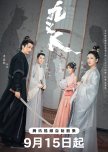
Those who seek revenge dig two graves.
This is a heartbreaking and sobering revenge drama about an ancient Me Too movenment by nine commoners seeking justice. The two main protagonists, Rulan and Meng Wan are apprentices at Yanyu Tower, whose exquisite embroidery are prized by the imperial palace. Underneath his polished and elegant facade, Yanyu Tower's proprietor and master embroiderer Wu Lian is the worst kind of predator; one who uses his power and privilege to repeatedly manipulate and abuse the young women working for him. When Rulan has the audacity and tenacity to seek legal redress, most including her bestie Meng Wan hesitate to help her; knowing how stacked the system is against them. Ultimately her plight and her conviction inspires nine people to devote their entire reason for existence to taking Wu Lian down and obtaining justice for Rulan and in some cases themselves. There are no fairytales in this drama; their stories are utterly devastating; alternately moving me to tears and making my teeth clench and my blood boil.This drama is not for the faint hearted and comes with a ton of trigger warnings. It is ruthless and brutal in terms of its scathing depiction of the unbalanced power dynamics between the powerful and the powerless. It convincingly articulates why regardless of consequences, Rulan, Meng Wan and their friends decide to take a stand against a clever, powerful and ruthless opponent. Their efforts are stymied at almost every turn and many of them pay the dear cost of justice. Wu Lian is almost too smart a villain and too well resourced. It is dismaying to see these nine avengers fall for the same traps over and over. In desperation, some of them take unnecessary risks and make terrible sacrifices with scant payoff in their attempt to gather enough evidence to indict him.
This is a large cast with consequential roles that deliver all around strong performances. Hu Yixuan's portrayal of Rulan's disillusionment, agony, bravery and forlorn quest for justice is harrowing, piteous and ultimately tragic. Wu Qian also impresses as the icily soft spoken, resolute avenging angel and mastermind of the revenge plot. As for Wu Lian, it is rare to encounter such an intelligent and downright despicable villain, masterfully acted by Qiao Zhenyu. All of the support roles come together well to paint a picture of common people from all walks of life with dreams and goals that get disrupted as they come together to get justice. The thief Li Chunfeng and the embroideress Jue Ming charmed and moved me into rooting for them most.
This kind of drama that tackles such a difficult subject matter is unlikely to appeal broad audiences. It is well executed for the most part but tends to be unnecessarily melodramatic in the later arcs. The villain origin backstory left me unmoved and is not convincing. I would expect Wu Lian's father's concubine to have impacted him in a more positive way. While this story ends in a realistic way, I am not satisfied. Wu Lian's enablers who covered for him repeatedly get off way too lightly. Finally the way this wraps up sends too strong a message that those who seek revenge dig two graves. Revenge becomes their sole purpose and end game to the extent that I wonder - did they really win? There is just too much collateral damage and sacrifice even though Humpty Dumpty can not be put together again. Maybe it would have been better to just live well. I needed to see at least one of the victims recover from this and go on to have a good life. The final What If episode 25 made me feel worse not better. I struggle with how to rate this. As much as I applaud the topic, the acting and how emotionally invested I got in the story, it left me with a hollow feeling after the ending arcs. It is still a good, thought provoking watch but I can only rate this a 7.5/10.0.
Was this review helpful to you?
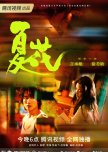
Let life be beautiful like summer flowers...
This tantalizing and poignant love story captures the spirit of carpe diem. It opens with a young girl's chance encounter at the hair salon. She is aroused by a strong and silent stranger from the way he caresses her ears and washes her hair. For most girls, it would stop just there; a titillating fantasy not to be acted upon. But He Ran is not like most girls. She throws herself at Xiao Han shamelessly; not one whit bothered that he is well into his prime. Twist and all, this is a simple and very cliched romance plot that hinges on the chemistry between the leads and whether they can convince audiences to root for them.He Ran's relentless pursuit of Xiao Han can very easily come across as crude and thirsty but Xu Ruohan gets this tricky portrayal mostly right down to the small nuances. She is just an artless young, girl headily experiencing infatuation, desire, and possibly even love for the very first time. She can be incredibly petulant, unreasonable, and childish, like the protected and spoiled little rich girl she is. But she taunts and tempts him with the instinctive provocativeness and burgeoning sensuality of a child-woman. The way she looks at him with her heart in her eyes and the effervescent joy in her smile made me shake my head at the futility of Xiao Han's efforts to evade her charms.
As for Xiao Han, his genuine attempts to resist the ardent allure of this captivating young temptress is just the right touch. He rightly has misgivings - she is too young and they are from different worlds. Xiao Han is a man of few words; a gentle giant who is very still and seemingly unmoved by her attempts to seduce him. Only the smallest microexpressions give him away - the hint of a smile, a tensing of his incredible jawline, a barely perceptible slow sidelong glance, and a whisper of innuendo in his tone. While Xiao Han clearly looks and is more mature, the relationship doesn't come across as exploitative largely because He Ran is the instigator and calls most of the shots. Of course, it helps that Jerry Yan does not look a day over thirty and the only offensive thing about him is how well he wears those sleeveless wife-beater T-shirts.
Their love story unfolds against a lush, almost surreal romantic palette drenched with deep and lush saturated colors of the riotous blooms adorning Xiao Han's intimate seaside home. The couple's sultry chemistry permeates the screen, captured mesmerizingly by the director's avant-garde and sensual visual composition style. The superbly curated soundtrack supercharges the narrative with all the right emotions at every critical juncture. I was invested in their romance the moment I heard the first song, Cantopop hit (半點心 A Drop of Your Heart). At the time, they had barely even met! I am so busy being a Peeping Tom that it takes me a while to notice that the plot doesn't move much. He Ran is just escaping into Xiao Han's world and their relationship is built around "ask me no questions and I will tell you no lies". They are both secretive and repeatedly fail to communicate. Thus despite its addictive beauty, theirs does not bear the hallmarks of a lasting relationship.
He Ran and Xiao Han's relationship shortcomings are amplified by the too coincidental to be true gender reversed second age-gap romance. There the couple actually dares to call each other out and are open about themselves and their doubts and constraints. That said, their initial attraction is too tropey and not convincing and it is a major subplot that develops too late in the main plot line; right after He Ran and Xiao Han's relationship peaks. This long-winded and often boring digression annoyed me and disrupted the momentum of the main romance. Their sizzling chemistry also highlights a more adult passionate intensity that seems missing in He Ran and Xiao Han's encounters.
The Chinese title of this drama 夏花 / Xià Huā or Summer Flowers, comes from Rabindranath Tagore's poem "Let life be beautiful like summer flowers..." After Shakespeare, Tagore is the most widely read and well-loved foreign poet in China. Thus there is already a lot of foreshadowing in the Chinese title. But I think it is not that important how He Ran and Xiao Han's story ends. Because the story's real message is about living in the moment and daring to live and love with no conditions or expectations for the future. That they did and like summer flowers, their love bloomed with wild abandon drenching the earth with the radiant, ecstatic colors of beautiful life. With a little bit of help from Uncle Han, who is just the best fairy godfather ever.
As for the ending, I didn't like it. Not at all. It diminishes both main characters. It is why even though I love many parts of this drama, I can only rate it a 7.5. A better ending would have gotten an 8.0-8.5 from me. I will elaborate on why I am so disappointed in the ending below. It is of course a major spoiler so please don't scroll down if you have not finished watching the drama.
Warning - major ending spoiler way down below.
Major Ending Spoiler
To me killing off a character is a lot better than killing the character of the character. And that is what leaving the door open for some ambiguity does - both He Ran and Xiao Han's characterizations suffer as a consequence. The ending should have been clear and decisive. The drama consistently builds up to it. This loosey-goosey ending makes the timeline messy and creates unnecessary loose ends. Did Xiao Han not accompany He Ran to seek treatment? What about his promise to care for her? Surely he was not growing flowers at home while she was fighting for her life thousands of miles away. But what really takes the cake is He Ran's unreasonable demand that Xiao Han waits for her and loves no one else. It is utterly selfish and insensitive. What if his first love had demanded that of him and he never gave He Ran the time of the day? Dying is easy, it puts her beyond all further suffering and emotion. From then, the suffering begins for the survivors. She sets her mother free but poor Xiao Han is supposed to miss her for the rest of his life? Did she ever even truly love him? Wow! This cop-out ending made me intensely dislike He Ran instead of remembering her poignantly as the brave young girl she was at the beginning. A girl who chose to live life gloriously if briefly instead of wallowing in self-pity.
"Let life be beautiful like summer flowers and death like autumn leaves." - Stray Birds by Rabindranath Tagore
Was this review helpful to you?
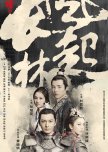
Nirvana in Fire Season 2: The Wind Blows in Chang Lin
27 people found this review helpful
Closure
While NIF2 works as a superb standalone story, it is best appreciated if watched after NIF. Also be aware some of my comments may be spoilers for NIF so best not to read this if you haven't watched it.NIF2 is the story of the changing fortunes of the Changlin family as together with the Liang empire, they navigate a changing of the guard. While the story skips a generation, the ghost of Lin Shu "haunts" the drama. After all, the powerful Changlin Army is the legacy Prince Jing created in Mei Changsu/Lin Shu's memory. Xiao Tingsheng, the now elderly Prince of Changlin instills in his family the same moral values, duty, honor and loyalty that were innate to Prince Jing and Lin Shu. His sons Xiao Pingzhang and Xiao Pingjing grow up with and share a deep bond beyond blood ties with their imperial peers, especially the Crown Prince and their cousin Xiao Yuanqi. Their proximity to the throne and unbalanced power in the court is feared and envied by many. This sets the stage for political plots and intrigue at the highest levels of the court that pose many challenges for the Changlin family. This brings the free spirited and fun loving Pingjing back from the famed Langya hall to aid his more responsible elder brother Pingzhang, the heir who already shares their father's duties.
In NIF, we can only imagine what young Lin Shu's life was like. NIF2 invites us to experience being in the bosom of a close and loving family at the epicenter of power in the empire. We laugh and we cry with them, their friends are our friends, their foes our enemies, their hopes our hopes and we feel the pain of their losses in an acute and very real way. The script-writing and plot in this drama is deep and masterful in a way that rivals that of NIF. While political plotting, revenge, justice, loyalty, morality, duty and envy are still strong themes, it dives more deeply into relationships between sovereign and subject, parent and child, husband and wife and siblings and cousins while exploring the fine line between good and evil and nature vs nurture. Unlike NIF, the story does not revolve around one core character but a number of key characters. Like NIF there are many grey characters and even the good characters are very realistically written with their own strengths and flaws. These lead characters evolve over time as the story-line spans a generation shift and explores how these characters deal with change. The second half of the drama focuses on the younger generation and this is where weakness in the acting emerged as these demanding transitions are played out by younger and less experienced actors. That said, overall the cast was very strong and well populated with many veteran actors.
Newcomer Liu Haoran's Xiao Pingjing was stellarly portrayed from start to finish. He managed to "grow up" from the immature, playful, outspoken, impetuous and slightly irresponsible younger son to be a skilled pugilist, brilliant general and military tactician, the rising star of the Changlin family. This actor immediately conveyed that Pingjing must be what a young Lin Shu (whom we never met in NIF) would have been like. He is the young actor to watch coming out of NIF2. Sadly his love interest Lin Xi was played by a limited and forgettable young actress. Lin Xi's father was killed before she was born so she is an aloof character, a talented and capable lady doctor. She had to make a terrible, controversial and life altering decision in this drama. This is an awesome part that a better actress could have killed. This one wore a perpetually tragic expression and when pressed to defend her decision she overacted, wailing in a completely out of character way. There was no chemistry between Pingjing and Lin Xi and as a couple, they were not convincing. Pingzhang and his wife Meng Qianxue on the other hand were touchingly in sync with each other. Fortunately this is not a love story although there is more romance than NIF. Both female leads were strong and well written characters but only Meng Qianxue's role was well acted.
In the second half of the drama, cousin Xiao Yuanqi also comes of age, clawing his way up despite the disgrace his father (the youngest son of Prince JIng) brought on to their branch of the family. Yuanqi is a chameleon and the most interesting, complex and empathetic character in the entire drama. To be fair it is a challenging role, one that actor Wu Haochen was not up to. While his performance was technically good, it was also pedestrian and boring. He simply lacks onscreen presence and charisma. I didn't want to watch him and would either tune out or tune into whoever he was sharing the screen with. This was too critical a role for them to have miscast so badly. The character itself was exceedingly well developed, it just didn't come to life in the right way. It is why for me this drama is not a perfect 10 even though the script, plot and story-line can hold its own against NIF.
NIF broke my heart because even though Lin Shu/Mei Changsu got his justice, it was his final act. What he lost could never be recovered. I was inconsolable for a long time. Watching NIF2 was cathartic because NIF2 shows us that his legacy and everything he stood for lives on in all the lives he touched. And despite its own tragic moments, in NIF2 we get to imagine that maybe Lin Shu came back to fulfill his final promise. That gave me the closure I badly needed.
Was this review helpful to you?
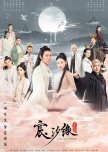
Aged to perfection.
Since Love and Destiny was produced by the same team and resides in the same world, comparisons to TMOPB are inevitable. Pleasingly, the only connection is that it takes place earlier in the same 3L3W universe. This is efficient as less time is wasted on world building and explaining the tribes, hierarchies, time and other conventions. The story-line sticks to the 3L3W formula of an unforgettable love story that spans three lives and three realms. While TMOPB was an intensely passionate love story, this has more of a romantic comedy flavor. This is the story of a pure heart-ed young fairy who falls in love with the powerful and much older God of War. This relationship dynamic sets up for a different love story that again succeeds in delighting and captivating in a way that is now becoming a 3L3W brand.The plot is common for this genre (save the world or save the girl) and is this drama's biggest weakness. Those familiar with the director may observe the backstory of some leading characters (Jiu Chen, Ling Xi and Jing Xiu) were inspired by Journey of Flower - (Bai Zhihua, Hua Qiangu and Dongfang). That said, L&D is neither another TMOPB, nor JOF but a delightful story that stands on its own, albeit with a few cliche tropes. The three main arcs could have been better balanced - the first two took too long and did not leave much time for the final, most satisfying arc. There were too many (well executed) comedic fillers in this drama. This made it feel like "nothing's happening" or the relationship progressed too slowly.
The weak plot was compensated for by superb acting by the main leads. Veteran actors Chang Chen (Jiu Chen) and Ni Ni (Ling Xi) were perfectly matched. They are both gorgeous actors whose emotions and facial expressions transform and make them compelling in their appeal. The role of Jiu Chen was made for a Chang Chen that is aged to perfection - his sculpted bone structure and fierce expression exudes the aura of a stoic, mature and powerful God of War. Any suggestion that some young idol actor could have pulled this off is ridiculous. Jiu Chen is a formidable character that wears the lonely responsibility of keeping the realms safe. He moves mountains to force a win-win in his terrible conflict between duty and love. His instinct is to protect Ling Xi, to the fault of hiding the truth from her. He is alternately stern and helplessly indulgent with her. His impassive expression softens, he even smiles and becomes open and vulnerable only with Ling Xi. He is touchingly candid and unguarded when he confesses his feelings to her. With insight beyond her youth, Ling Xi recognizes the loneliness and burden inherent in Jiu Chen's role. She captivates him with her spell-blinding smile and mischievous antics; he is touched by her devotion and inept attempts to aid him. As their feelings grow, you can feel the invisible bond of their awareness and affection for each other. Ling Xi's best, most courageous moments are when she makes unbelievable sacrifices in order not to add to Jiu Chen's burdens. Each loves the other more than they love themselves.
In the first arc (20+ episodes), the Ling Xi wakes up Jiu Chen, who had been frozen for 50,000 years after sealing the Demon King. He is suspicious that such a weak fairy could have awakened him and takes her in, ostensibly to care for his health. The guileless and infatuated Ling Xi is delighted and disrupts his household with her comical attempts to entice him. She loses her senses over him and fires up his stone cold heart with her devotion. However, as God of War it is his duty to execute the young fairy with the ability to release the Demon King. Initially I found Ling Xi too subservient; a bird immortal with a bit of a bird brain. Yet Ni Ni's portrayal of Ling Xi was never annoying, indeed I was charmed despite my preference for stronger characters. She won me over when she bravely steps up to protect Jiu Chen and takes responsibility for her own life.
In the second arc (up to episode 50), Ling Xi is reincarnated as a mortal Lin Mo who has to go through three trials. She overcomes many challenges and becomes independent along the way. This is where Jing Xiu emerges as a manipulative, petty and sinister love rival to Jiu Chen. Episodes 30-40 can be skipped - this part was draggy and I struggled to empathize with Jing Xiu. This actor overacted the villain when he is actually supposed to be a grey character - he was so selfish, manipulative and creepy I was irritated at Ling Xi for not being wary of him. There were many unnecessary side characters in this arc that lingers too long on Ling Xi's coming of age. The best moments are between episodes 40-50 where Jiu Chen and Lin Mo fall touchingly in love (again). The final arc was the shortest and the sweetest. Ling Xi becomes a powerful high goddess who forces Jiu Chen to let her share his burdens and they face their enemy together.
The supporting cast was strong and there is a lovely secondary love story between Yun Fung and Qing Yao that is nicely intertwined with the primary. The villains did a decent job being evil and hateful but their motivators were typical: revenge, envy and obsessive unrequited love. The OST is very good but the CGI is quite dreadful. Overall a quality and enjoyable drama with a big budget. The bottom line remains as a love story, it boils down to the main leads. In this, they delivered - virtually all of their scenes brought a silly, lovesick and goofy smile to my face. You will enjoy this immensely if you appreciate leading actors and a love story that is truly aged to perfection.
PS - got a number of PMs re: comparison to TMOPB. I avoided directly comparing them but I also reviewed TMOPB and if you read that, what I think the differences are is obvious and reflected in the rating.
Was this review helpful to you?
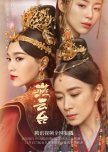
One step forward for mankind and two giant steps backwards for womankind.
This romanticized account of the life story of Xiao Yanyan, the accomplished Khitan Empress Chengtian (953-1009), gives voice to folk or unofficial history of her relationship with Han Derang. Wild history of their love affair survived over a thousand years and continues to fire the imagination of Chinese historians today.Please be aware of mild spoilers ahead (unless you already know the history).
It is known that Xiao Yanyan, was once engaged to Han Derang, who was from an elite Han Chinese family loyal to the Khitan rulers. According to the drama (which is based on a novel), her father chancellor Xiao Siwen and Han Derang help Mingyi (Emperor Jingzong) ascend the throne. Mingyi is sickly and his hold onto power is thus unstable; many branches of the royal family vie for the throne. Mingyi insists on marrying Yanyan so that like both his main rivals who married Yanyan's older sisters, his wife is also of royal bloodline. This kind of ill fated romance has limited appeal to most romance watchers and is an unnecessary digression for most historical or political drama buffs.
Although I was primarily interested in the history, Tang Yan and Dou Xiao's portrayal of the young lovebirds captured my heart and I was devastated by their forced separation. But alas their chemistry fizzles out later on in the drama and leaves me unconvinced that they are soul mates whose love is as deep or as epic as folk history suggests. At face, the bare facts are tantalizing - he shores up her regency over her young son Emperor Shengzong; is her trusted confidante and is highly ranked in her court; they may even have married and had a child together and; he was likely buried besides her. But in their more mature personas, both characters just seem sad, tired and lonely and not long lost soul mates who finally have their moment in the sun. It does not help that Tang Yan appears to have an easier, more natural chemistry with Jing Chao's Mingyi. To make matters worse, there are no nuances or subtleties in Yanyan's interactions with Mingyi and Derang that suggests they mean different things to her, that her relationship with and affection for each of them is not the same.
Mingyi is the most layered, complex and interesting character in this drama and probably one of the best grey characters I have seen this year. Although I resent his manipulation, his selfishness, his obscene sense of entitlement and his disingenuous excuses for doing terrible things, I also grudgingly empathized with him and the monumental task in front of him. Jing Chao really delivers one of the most convincing portrayals of a sociopath emperor who has the audacity to steal his best friend's fiancé and yet demands and expects them to protect his legacy. Unfortunately although she delivers a few good scenes, Tang Yan fails to evoke a strong and powerful empress who can rule alongside and then after the emperor. She cannot hold onto her strong moments, just defaults back to her comfort zone of a very beautiful and feminine woman that is to be rescued and protected. Her attempts at gravitas just results in a cold, aloof empress that doesn't allow any sparks to fly; even when she is free to be with the alleged love of her life. To be fair Tang Yan was pregnant during the shooting and that put limits on her ability to do the more physically challenging scenes but she still did not have to be written to be so mopey and passive aggressive.
The other magnificently and effortless acted role is Sheh Szeman's Xiao Hunian who is everything and more of what I imagined Yanyan would be. Her portrayal of a strong, yet feminine woman who bows to duty without wallowing in self pity; who is a fierce, strategic warrior that stands up to the menacing Yansage; who does as she pleases and shows her displeasure as effectively in words as in action puts Tang Yan's meek and insipid performance to shame. When Hunian tells Han Derang that it was just a twist of fate, else she would be just as great an empress, that resonates because art imitates life; a younger Sheh Szeman would have conveyed an unforgettable Xiao Yanyan. I did not approve of how the writing undermines Hunian in the final arc - even though Sheh Szeman got more airtime and had some awesome scenes, it was just not the right thing to do to the character.
While this drama as a whole does not live up to my expectations, I found many parts of it to be riveting. The power struggles and the battle for the throne are well written and shot but the story peaks at the Yansage arc. The battle footage and strategies used to route the enemy in this arc are bloodthirsty and exciting but is too early for the climax of the drama. To some extent that cannot be helped as it is the correct sequence historically. That said, after the Yansage arc, the focus of the story should shift from internal strife to external strife rather than focus on a series of much weaker, rather pathetic attempts at coups by the least interesting characters in the drama. It does little more than to drive home how hard it is for a widowed empress to hold on to the throne as regent without a strong military backer. It does highlight Han Derang's contributions and achievements as the unsung hero and the true power behind the Liao throne.
To me this is a 7.5/8.0 but I am going with 7.5 because I expected to watch a drama about a woman warrior who chose her country over her true love and then went on to make Liao great so that her sacrifice would be worth something. Instead, I may as well have watched her get her revenge on Mingyi by doing nothing besides get fat on sweet cakes and having flings with stable boys. But I learned many things about Liao/Khitan culture, including that Khitan women were very equal and progressive - they can get divorced, remarry if widowed, lead armies, hold positions and even rule in court. Which is really ironic because Mingyi's legacy Han reforms that were among Yanyan and Han Derang's greatest achievements basically Sinicized the nomadic Liao people to their vast benefit in terms of agriculture, language, culture and administrative and legal systems. But it also set Liao women back thousands of years in terms of the status and freedom. So what our warrior empress really achieved was one step forwards for mankind and two giant steps backwards for womankind. Maybe Tang Yan's portrayal wasn't that far off...
Was this review helpful to you?


 53
53 189
189 8
8



















